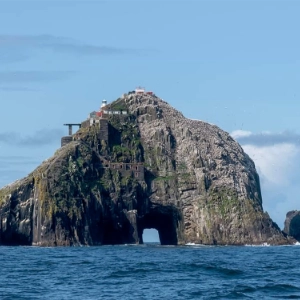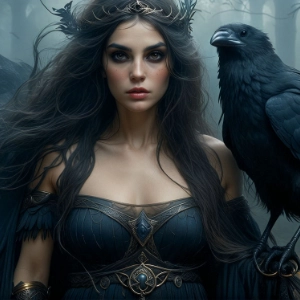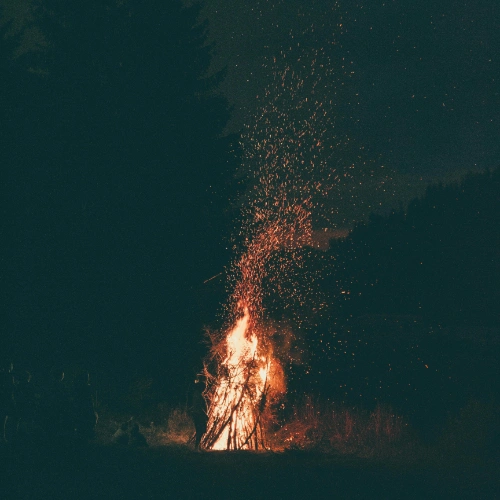Who is The Irish God of Death?
Who is th Irish God of Death? Irish mythology is full of fascinating stories and characters, with a rich pantheon of gods and goddesses representing different aspects of life, nature, and the cosmos. From mighty warriors to wise rulers, the gods of Ireland played essential roles in shaping the beliefs and traditions of the ancient Celts. One of the key themes in Irish mythology is the cycle of life and death, which was viewed as a natural, continuous process.
For the Celts, death was not the end but a transition to another world, often called the Otherworld. This belief in an afterlife was central to their culture, and many gods were associated with different parts of this journey.
One god stands out when it comes to death and the afterlife—Donn, the “Dark One.” As the god most closely connected to death, Donn is believed to be the ruler of Tech Duinn, the place where souls of the dead go before continuing to the Otherworld. In this post, we’ll explore Donn’s role in Irish mythology, his connection to death, and how he guided the souls of the dead on their final journey.
Table of Contents
Who Is the Irish God Donn?
In Irish mythology, Donn is known as the god of death and the ruler of the dead. His name, “The Dark One,” reflects his strong connection to the end of life and the mysterious journey that follows. Donn is believed to dwell at Tech Duinn, a mythical island where the souls of the dead go before moving on to the Otherworld.
As a guide of souls, Donn plays a crucial role in the afterlife. He helps ensure that souls reach their destination safely, guiding them to the next stage of their journey after death. Though feared as the lord of the dead, Donn is also respected for his role in the natural cycle of life, reminding us that death is a necessary part of existence.
Tech Duinn – The House of Donn

Tech Duinn is the mythological island where Donn, the god of death, rules over the dead. This rocky, mysterious island is located off the coast of Ireland. It is believed to be the first stop for souls after they die. According to ancient Irish tradition, all souls travel to Tech Duinn before continuing to the Otherworld, making it a gateway between life and death.
Donn’s strong connection to Tech Duinn reinforces his role as the guardian of the dead. It was believed that he watched over the souls as they arrived on his island, ensuring they passed safely to the next part of their journey. For the Celts, Tech Duinn was a place of both fear and reverence, where the spirits of the dead would gather before moving on to their final resting place in the afterlife.
Tech Duinn is believed to have been located on Bull-Rock off the Cork Coast in the Bears Peninsula. It was believed to be the home of Donn the God of Death and the portal to the otherworld.
Donn’s Role in the Cycle of Life and Death
In Celtic tradition, Donn is a significant figure in the natural cycle of life and death. He is seen as a vital figure who helps maintain the balance between the two. While many people may fear death, the Celts understood that it is a natural part of existence. As the god of death, Donn embodies this truth, reminding the living that death is not something to be avoided but rather a necessary transition.
Those who honour Donn fear him and respect him. People often see him as an influential figure who controls the fate of souls. This fear comes from the unknown nature of death, but the respect stems from the understanding that Donn plays an essential role in the cycle of life. Without death, there could be no rebirth or renewal, and Donn’s presence ensures this cycle continues.
Donn helps create a balance in the universe by ruling over the dead. His guidance of souls allows for the proper passage from life to death, ensuring that the natural order is upheld. In this way, Donn’s role is crucial, as he connects the living with the deceased, reminding everyone that life and death are intertwined and part of a larger cosmic cycle.
Donn’s Relationship with Other Deities

In Irish mythology, Donn shares his domain with several other influential figures connected to death and the afterlife. Two notable deities are The Morrígan and Manannán mac Lir.
The Morrígan is a goddess of war and fate, often associated with death on the battlefield. She is known for her ability to foresee death and influence the outcomes of battles, sometimes appearing in the form of a raven. While Donn governs the resting place of the dead, The Morrígan actively determines who lives and dies. Her role is more dynamic and often chaotic, contrasting with Donn’s steady presence in the afterlife.
Another significant figure is Manannán mac Lir, the god of the sea. He acts as a guide, helping souls cross the waters to the Otherworld. While Donn oversees the realm of the dead, Manannán ensures that souls safely reach their destination after death. Together, they play complementary roles in the afterlife journey, with Donn focusing on the resting place and Manannán on the passage itself.
Despite his vital role in the cycle of life and death, Donn is often less well-known than other famous gods like Dagda or Lugh. While Dagda is celebrated as an influential father figure and a provider of abundance, and Lugh is known for his many skills and achievements, Donn’s influence is quieter yet equally important in maintaining the cosmic order. His presence ensures that the balance between life and death is respected, highlighting the interconnectedness of all deities in the rich tapestry of Irish mythology.
Symbolism and Legacy of Donn

Donn represents death not as something to be feared but as an essential part of life’s inevitable journey. In Celtic belief, death was seen as a natural transition rather than an end. Donn’s role as the god of death reminds us that every life has its cycle, and just as there is birth, there is also death. This understanding fosters acceptance and reverence for the natural order of existence.
Donn’s legacy lives on in Irish folklore, where his stories and significance are still remembered today. While he may not be as widely recognized as other deities, his influence can be seen in various aspects of Irish culture. Modern celebrations and customs often reflect themes of remembrance and honouring the dead, echoing the values that Donn embodies.
In ancient times, seasonal festivals such as Samhain were dedicated to honouring the dead. This festival marked the end of the harvest season and the beginning of winter. During Samhain, it was believed that the veil between the living and the dead was thinnest, allowing spirits to roam the earth. Families would set places at the table for their deceased loved ones and light candles to guide their way back home. These practices echo Donn’s role as the guide of souls, reminding people of their connection to those who have passed on.
Today, many people in Ireland and beyond still celebrate the cycle of life and death, reflecting Donn’s lessons. His legacy reminds us that while death is a part of life, it is also a journey that leads to new beginnings. Through stories and traditions, Donn’s influence continues to shape how we view and honour the lives of those who have come before us.
